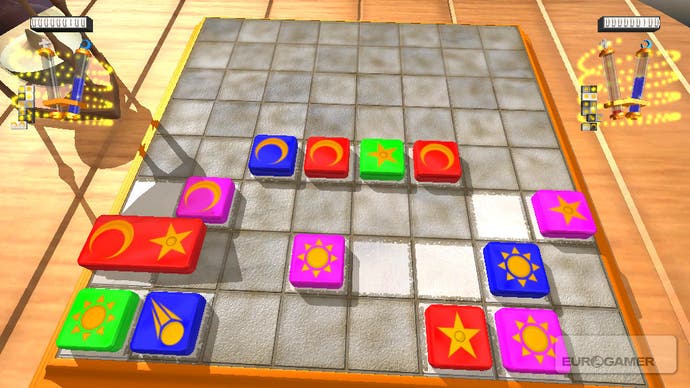Microsoft's Chris Satchell
On security, XNA on future Xbox platforms and serving the community.
That's a really good question - it's something that, at the moment we're saying no, community games won't have Achievements. We really need to think carefully about, you know, really seeing it work at a grand scale and would it make sense now or not, so there's no plans at the moment. That's not to say it's closed forever, but we really need to see how the community works.
If you think about it, Achievements are a currency, and you need to be very careful when you manage a currency that you don't devalue it in some way, and that's not a comment on the quality of the community games - I think they will be excellent - but I'd hate to have games that pop up that are like, 'click here for 50 Achievement points'. That kind of ruins it for everyone.
Well it's just that there's a lot of infrastructure to build. If you think about it, we've got this complex web front-end to build - complex from our perspective, although hopefully we've made it easy for developers to move through it, but there's a lot there to submit a game, maybe a screenshot, text, I need to be able to go and do the ratings on that, check its progress, people need to give me feedback - and then we've got this whole backend pipeline that can manage this whole process and all the reviews that come in from the other community members, can track it, make sure it's ready for distribution, then can package it all up and put it into our backend catalogues and things that we use to populate content on Xbox Live.
Then we have to work out a way for consumers to get to it easily. We're going to have a consumer-facing site on Windows as well, so you can go to the web and track all the content there and send people links to games you like, and so really it's just a lot of infrastructure we have to build and then link to a lot of other complex processes to make all this work. It's a big cross-group architecture effort to put all this together. And remember at the same time we're working on Game Studio 3.0, which will allow you to develop for Zune as well. We showed that at GDC, and we're still working on improving the tools side at the same time we're doing the pipeline.

There's two parts to that question. Let me address the first one. I think, assuming we're successful, I think the pipeline really is an incredible piece of innovation that will definitely enable other scenarios, and what's important about it is it's really addressing some of the problems with user-generated content.
I think we're seeing from some of the lawsuits out there - outside of our industry - that just saying you have reactive takedown isn't enough. You need to be more proactive about protecting people's IP and having content that's acceptable. So I think that's a major innovation. I absolutely believe that our pipeline, if successful, can help inform the design of those or even be used directly for other parts of our business.
Now the modding's a little different. Yes it could help rate mods, but the core issue of modding is what we talked about earlier - if you're not running in that sandbox, how do you guarantee security?
That's really where we've got stuck - making sure that nothing will hurt the user's system, and I'm a little disturbed when I think about other systems and people using what we call native code - code that goes right down to the metal - and then allowing people to run script mods on top of that without the right security measures. It could be really dangerous.
We've drawn a hard line because we very much care about security, and it seems like some other platforms don't seem to care quite as much. That kind of worries me for consumers. But all I can control is what we do on our platform, so that's where I'm going to focus - we're going to keep you safe because that's really important to us.
I think there's a potential risk on any platform where you're allowing...where you're running in what we call native mode, where you're writing straight to the metal, not a sandbox layer like XNA, and then that runs a script engine and you let people do that in that script engine.
Really what works in this industry is the people who have access to that native metal of the console, that go through these processes, are financially invested in this industry; they wouldn't do anything bad. Developers want to do good things because they want this industry to work. There's a lot of people out there that just want to prove they can screw things up.
I think there's very mature, sensible hackers who just want to prove how good they are, and they don't cause harm, and there's malicious hackers, and any platform that let's you do that, and doesn't have the right security measures in place - whether it's Sony, whether it's Nintendo, whether it's Apple, whether it's anyone - you're inviting trouble, because sooner or later someone will want to prove they can do it.
